The Cambridge History of China. Vol. 12: Republican China, 1912-1949, Part 1
Подождите немного. Документ загружается.

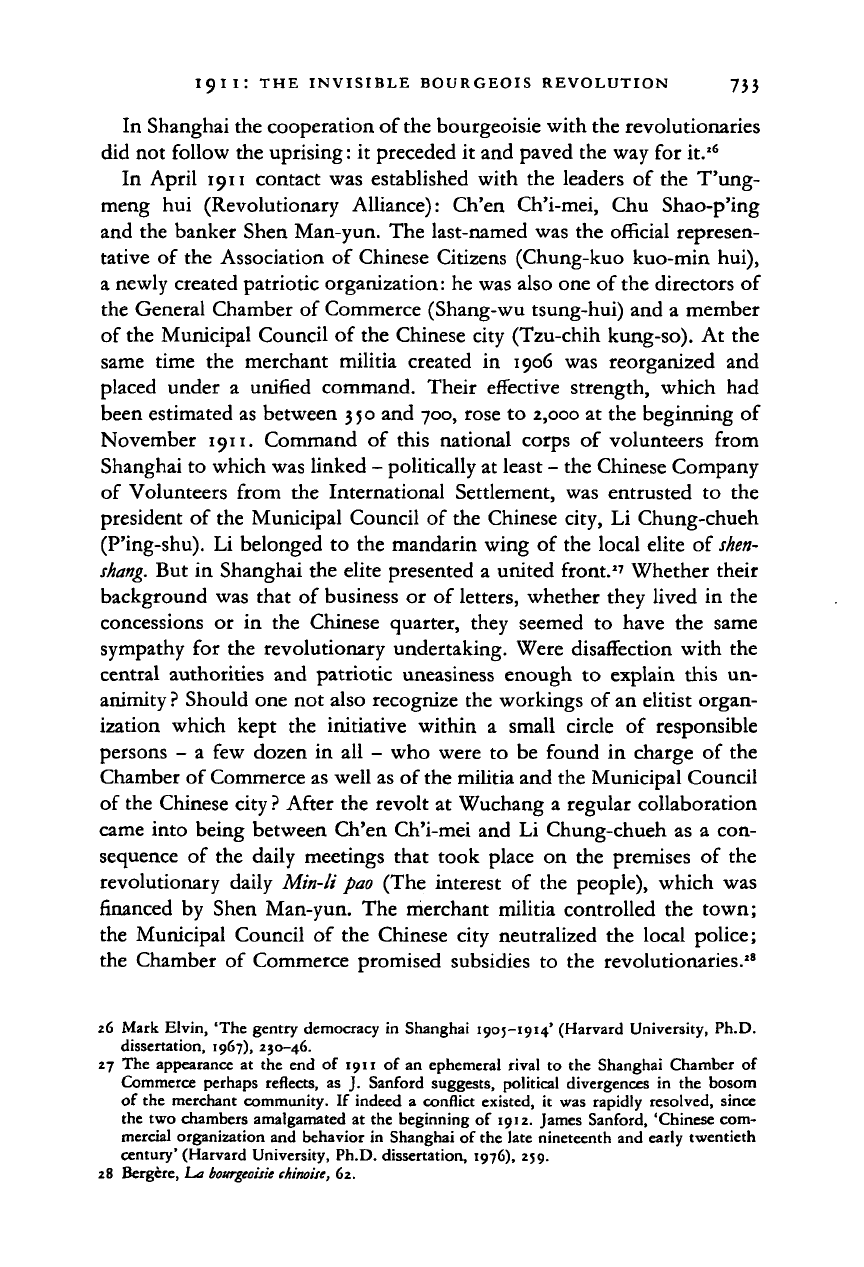
I 9 I
1
: THE INVISIBLE BOURGEOIS REVOLUTION 733
In Shanghai the cooperation of the bourgeoisie with the revolutionaries
did not follow the uprising: it preceded it and paved the way for it.'
6
In April 1911 contact was established with the leaders of the T'ung-
meng hui (Revolutionary Alliance): Ch'en Ch'i-mei, Chu Shao-p'ing
and the banker Shen Man-yun. The last-named was the official represen-
tative of the Association of Chinese Citizens (Chung-kuo kuo-min hui),
a newly created patriotic organization: he was also one of the directors of
the General Chamber of Commerce (Shang-wu tsung-hui) and a member
of the Municipal Council of the Chinese city (Tzu-chih kung-so). At the
same time the merchant militia created in 1906 was reorganized and
placed under a unified command. Their effective strength, which had
been estimated as between 350 and 700, rose to 2,000 at the beginning of
November 1911. Command of this national corps of volunteers from
Shanghai to which was linked - politically at least - the Chinese Company
of Volunteers from the International Settlement, was entrusted to the
president of the Municipal Council of the Chinese city, Li Chung-chueh
(P'ing-shu). Li belonged to the mandarin wing of the local elite of
shen-
shang.
But in Shanghai the elite presented a united front.
27
Whether their
background was that of business or of letters, whether they lived in the
concessions or in the Chinese quarter, they seemed to have the same
sympathy for the revolutionary undertaking. Were disaffection with the
central authorities and patriotic uneasiness enough to explain this un-
animity
?
Should one not also recognize the workings of an elitist organ-
ization which kept the initiative within a small circle of responsible
persons - a few dozen in all - who were to be found in charge of the
Chamber of Commerce as well as of the militia and the Municipal Council
of the Chinese city
?
After the revolt at Wuchang a regular collaboration
came into being between Ch'en Ch'i-mei and Li Chung-chueh as a con-
sequence of the daily meetings that took place on the premises of the
revolutionary daily Min-li
pao
(The interest of the people), which was
financed by Shen Man-yun. The merchant militia controlled the town;
the Municipal Council of the Chinese city neutralized the local police;
the Chamber of Commerce promised subsidies to the revolutionaries.
28
26 Mark Elvin, 'The gentry democracy in Shanghai 1905-1914' (Harvard University, Ph.D.
dissertation, 1967), 230-46.
27 The appearance at the end of 1911 of an ephemeral rival to the Shanghai Chamber of
Commerce perhaps reflects, as J. Sanford suggests, political divergences in the bosom
of the merchant community. If indeed a conflict existed, it was rapidly resolved, since
the two chambers amalgamated at the beginning of 1912. James Sanford, 'Chinese com-
mercial organization and behavior in Shanghai of the late nineteenth and early twentieth
century' (Harvard University, Ph.D. dissertation, 1976), 259.
28
Bergere,
La
bourgeoisie
chinoise,
62.
Cambridge Histories Online © Cambridge University Press, 2008
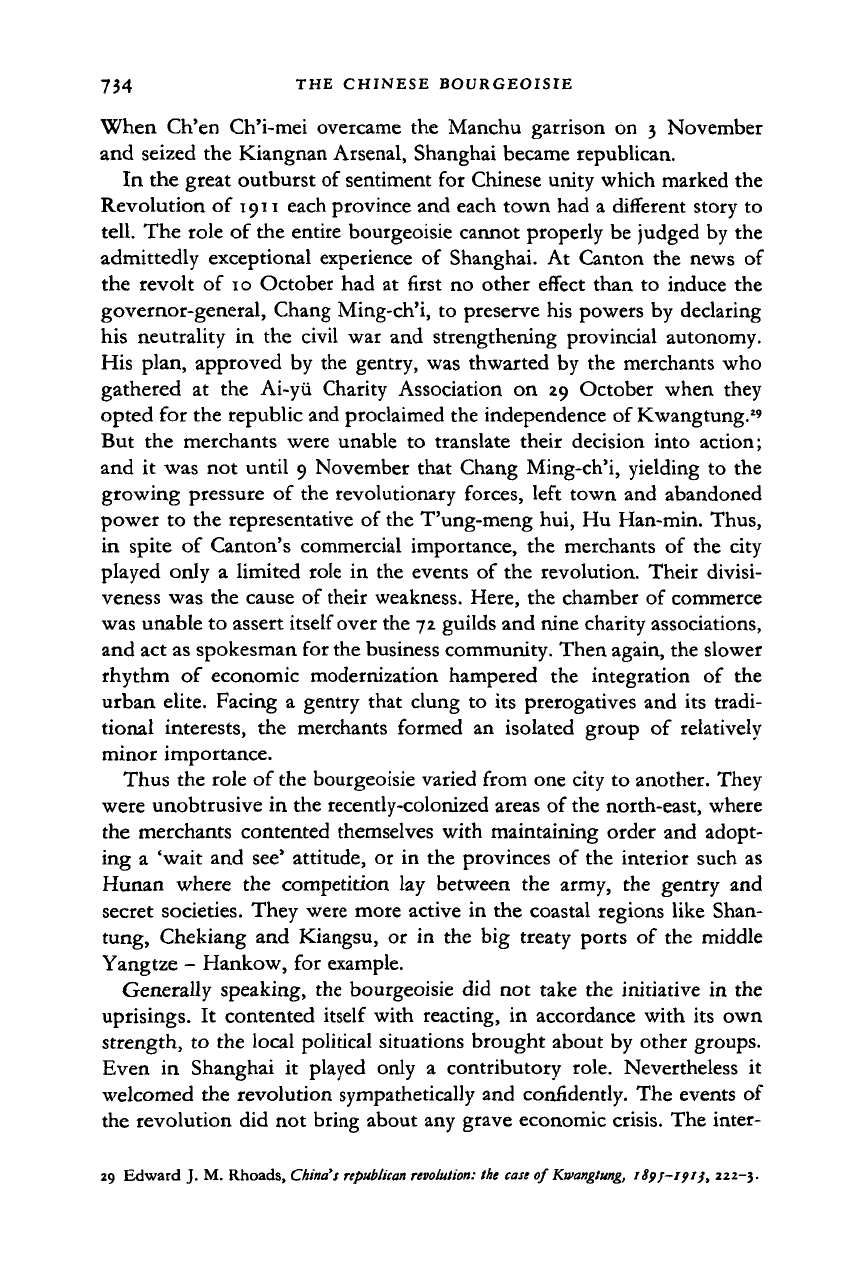
734
THE
CHINESE BOURGEOISIE
When Ch'en Ch'i-mei overcame
the
Manchu garrison
on 3
November
and seized the Kiangnan Arsenal, Shanghai became republican.
In the great outburst of sentiment
for
Chinese unity which marked the
Revolution
of
1911 each province and each town had
a
different story
to
tell.
The role
of
the entire bourgeoisie cannot properly be judged by the
admittedly exceptional experience
of
Shanghai.
At
Canton
the
news
of
the revolt
of
10 October had
at
first
no
other effect than
to
induce
the
governor-general, Chang Ming-ch'i,
to
preserve his powers by declaring
his neutrality
in the
civil war and strengthening provincial autonomy.
His plan, approved
by
the gentry, was thwarted
by
the merchants who
gathered
at the
Ai-yii Charity Association
on 29
October when they
opted for the republic and proclaimed the independence of Kwangtung.
29
But
the
merchants were unable
to
translate their decision into action;
and
it
was
not
until
9
November that Chang Ming-ch'i, yielding
to the
growing pressure
of
the revolutionary forces, left town and abandoned
power
to
the representative
of
the T'ung-meng hui,
Hu
Han-min. Thus,
in spite
of
Canton's commercial importance,
the
merchants
of
the city
played only
a
limited role
in
the events
of
the revolution. Their divisi-
veness was the cause
of
their weakness. Here, the chamber
of
commerce
was unable to assert itself over the 72 guilds and nine charity associations,
and act as spokesman for the business community. Then again, the slower
rhythm
of
economic modernization hampered
the
integration
of the
urban elite. Facing
a
gentry that clung
to its
prerogatives and
its
tradi-
tional interests,
the
merchants formed
an
isolated group
of
relatively
minor importance.
Thus the role
of
the bourgeoisie varied from one city to another. They
were unobtrusive
in
the recently-colonized areas of the north-east, where
the merchants contented themselves with maintaining order and adopt-
ing
a
'wait and see' attitude,
or in
the provinces
of
the interior such
as
Hunan where
the
competition
lay
between
the
army,
the
gentry
and
secret societies. They were more active
in
the coastal regions like Shan-
tung, Chekiang
and
Kiangsu,
or in the big
treaty ports
of
the middle
Yangtze
-
Hankow, for example.
Generally speaking, the bourgeoisie did
not
take the initiative
in
the
uprisings.
It
contented itself with reacting,
in
accordance with
its
own
strength,
to
the local political situations brought about by other groups.
Even
in
Shanghai
it
played only
a
contributory role. Nevertheless
it
welcomed the revolution sympathetically and confidently. The events
of
the revolution did not bring about any grave economic crisis. The inter-
29 Edward
J.
M. Rhoads,
China's republican
revolution:
the
case
of
Kwangtung,
iSff-ifi), 222-3.
Cambridge Histories Online © Cambridge University Press, 2008
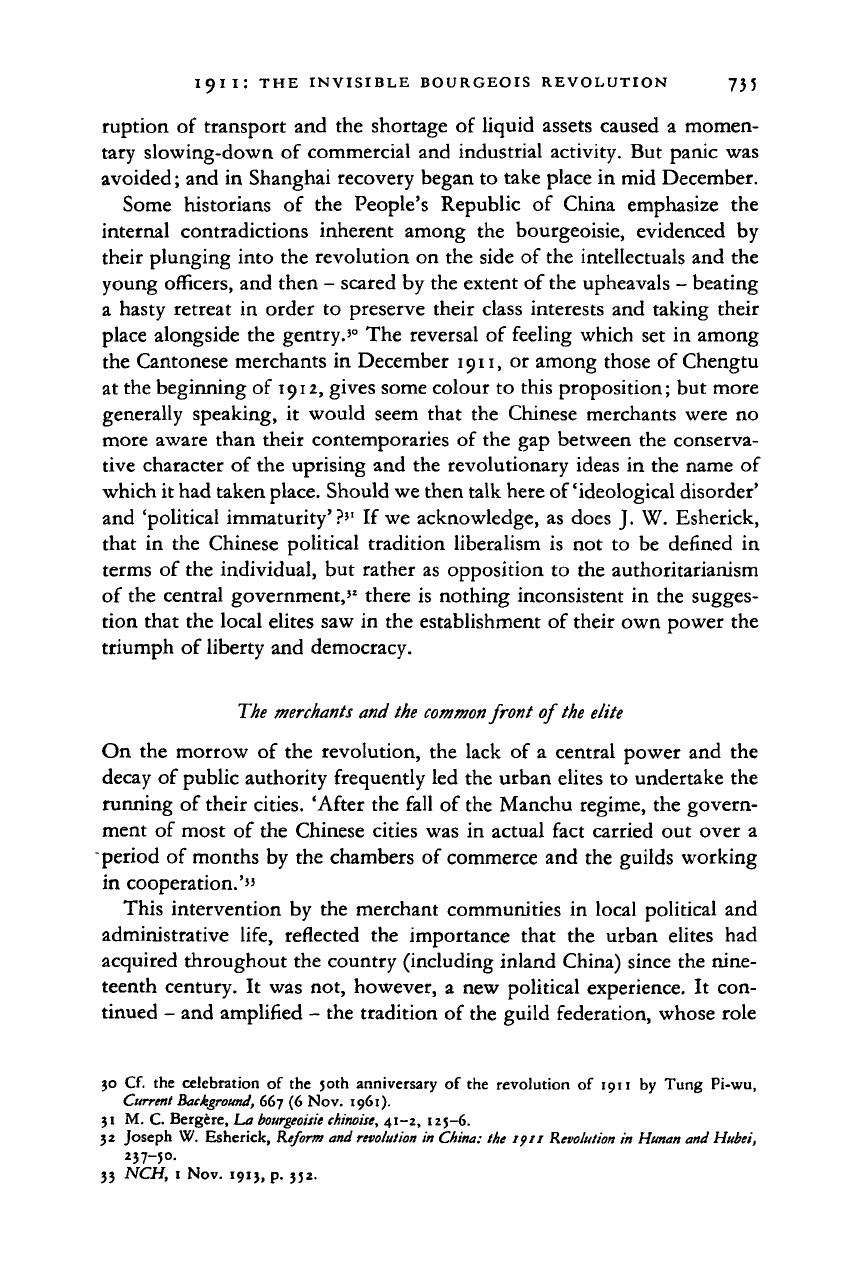
191 I! THE INVISIBLE BOURGEOIS REVOLUTION 735
ruption of transport and the shortage of liquid assets caused a momen-
tary slowing-down of commercial and industrial activity. But panic was
avoided; and in Shanghai recovery began to take place in mid December.
Some historians of the People's Republic of China emphasize the
internal contradictions inherent among the bourgeoisie, evidenced by
their plunging into the revolution on the side of the intellectuals and the
young officers, and then - scared by the extent of the upheavals - beating
a hasty retreat in order to preserve their class interests and taking their
place alongside the gentry.'" The reversal of feeling which set in among
the Cantonese merchants in December 1911, or among those of Chengtu
at the beginning of 1912, gives some colour to this proposition; but more
generally speaking, it would seem that the Chinese merchants were no
more aware than their contemporaries of the gap between the conserva-
tive character of the uprising and the revolutionary ideas in the name of
which it had taken
place.
Should we then talk here of 'ideological disorder'
and 'political immaturity'?'
1
If we acknowledge, as does J. W. Esherick,
that in the Chinese political tradition liberalism is not to be defined in
terms of the individual, but rather as opposition to the authoritarianism
of the central government,'
2
there is nothing inconsistent in the sugges-
tion that the local elites saw in the establishment of their own power the
triumph of liberty and democracy.
The
merchants
and the common front of
the
elite
On the morrow of the revolution, the lack of a central power and the
decay of public authority frequently led the urban elites to undertake the
running of their cities. 'After the fall of the Manchu regime, the govern-
ment of most of the Chinese cities was in actual fact carried out over a
"period of months by the chambers of commerce and the guilds working
in cooperation.'"
This intervention by the merchant communities in local political and
administrative life, reflected the importance that the urban elites had
acquired throughout the country (including inland China) since the nine-
teenth century. It was not, however, a new political experience. It con-
tinued - and amplified - the tradition of the guild federation, whose role
30 Cf. the celebration of the 50th anniversary of the revolution of 1911 by Tung Pi-wu,
Current
Background,
667 (6 Nov. 1961).
}i M. C. Bergere, La
bourgeoisie
chinoise,
41-2, 125-6.
32 Joseph W. Esherick, Reform and
revolution
in
China:
the 1911
Revolution
in
Hunan
and Hubei,
237-50.
33 NCH, 1 Nov. 1913, p. 352.
Cambridge Histories Online © Cambridge University Press, 2008
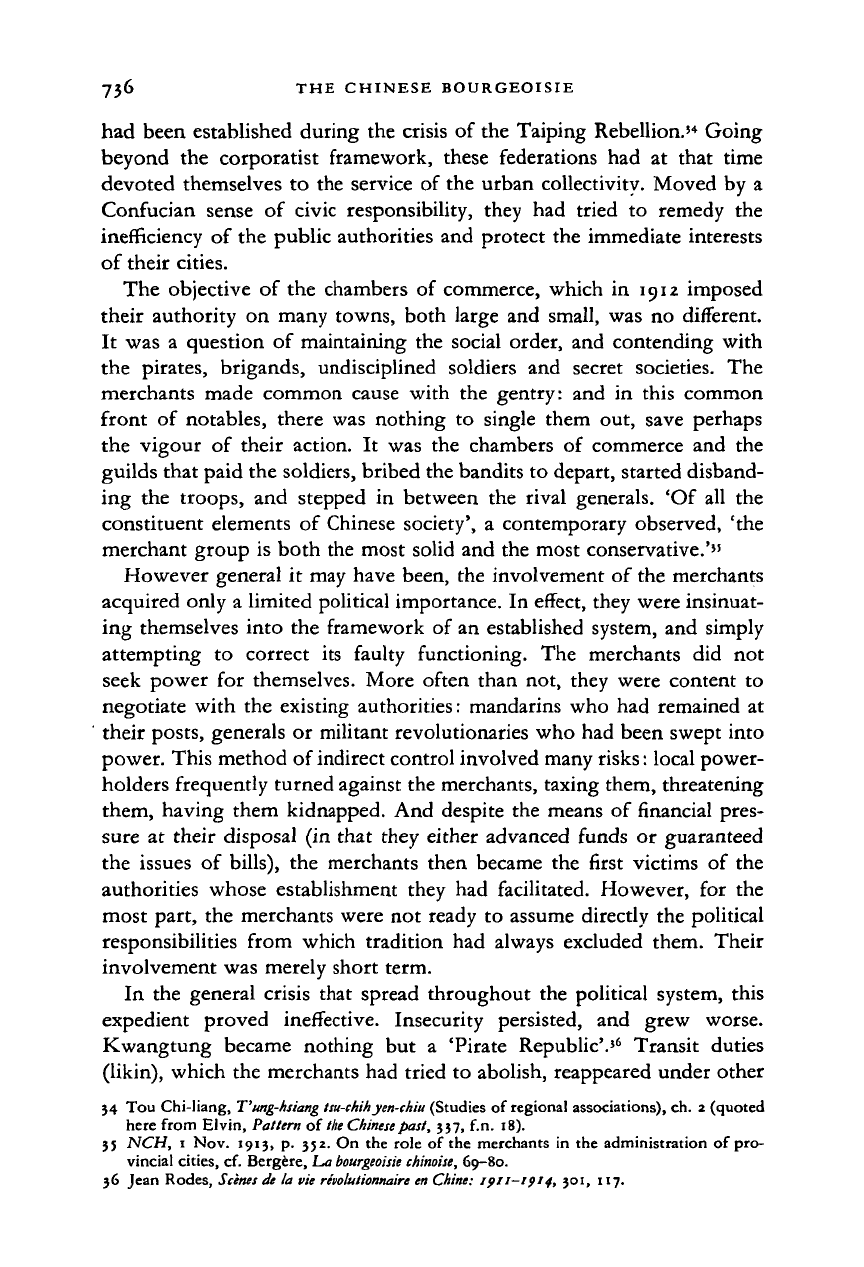
736 THE CHINESE BOURGEOISIE
had been established during the crisis of the Taiping Rebellion.'
4
Going
beyond
the
corporatist framework, these federations had
at
that time
devoted themselves
to
the service of the urban collectivity. Moved by
a
Confucian sense
of
civic responsibility, they
had
tried
to
remedy
the
inefficiency
of
the public authorities and protect the immediate interests
of their cities.
The objective
of
the chambers
of
commerce, which
in
1912 imposed
their authority
on
many towns, both large and small, was no different.
It was
a
question
of
maintaining the social order, and contending with
the pirates, brigands, undisciplined soldiers
and
secret societies.
The
merchants made common cause with the gentry: and
in
this common
front
of
notables, there was nothing
to
single them out, save perhaps
the vigour
of
their action.
It
was the chambers
of
commerce and
the
guilds that paid the soldiers, bribed the bandits to depart, started disband-
ing the troops, and stepped
in
between the rival generals.
'Of
all
the
constituent elements
of
Chinese society',
a
contemporary observed, 'the
merchant group is both the most solid and the most conservative.'
5
'
However general
it
may have been, the involvement of the merchants
acquired only a limited political importance. In effect, they were insinuat-
ing themselves into the framework of an established system, and simply
attempting
to
correct
its
faulty functioning.
The
merchants
did not
seek power
for
themselves. More often than not, they were content
to
negotiate with the existing authorities: mandarins who had remained
at
their posts, generals or militant revolutionaries who had been swept into
power. This method of indirect control involved many risks: local power-
holders frequently turned against the merchants, taxing them, threatening
them, having them kidnapped. And despite the means
of
financial pres-
sure
at
their disposal (in that they either advanced funds
or
guaranteed
the issues
of
bills),
the
merchants then became the first victims
of
the
authorities whose establishment they had facilitated. However,
for the
most part, the merchants were not ready to assume directly the political
responsibilities from which tradition had always excluded them. Their
involvement was merely short term.
In the general crisis that spread throughout the political system, this
expedient proved ineffective. Insecurity persisted,
and
grew worse.
Kwangtung became nothing
but a
'Pirate Republic'.'
6
Transit duties
(likin),
which the merchants had tried to abolish, reappeared under other
34 Tou Chi-liang, T'ung-hsiang tsu-chih yen-chiu (Studies
of
regional associations), ch. 2 (quoted
here from Elvin, Pattern
of
the Chinese
past, 337, f.n. 18).
35
NCH, 1
Nov. 1913,
p.
352. On the role
of
the merchants
in
the administration
of
pro-
vincial cities,
cf.
Bergere,
La
bourgeoisie
chinoise,
69-80.
36 Jean Rodes,
Scenes
de la vie
rivolutionnaire en
Chine: if 11-1914, 301, 117.
Cambridge Histories Online © Cambridge University Press, 2008
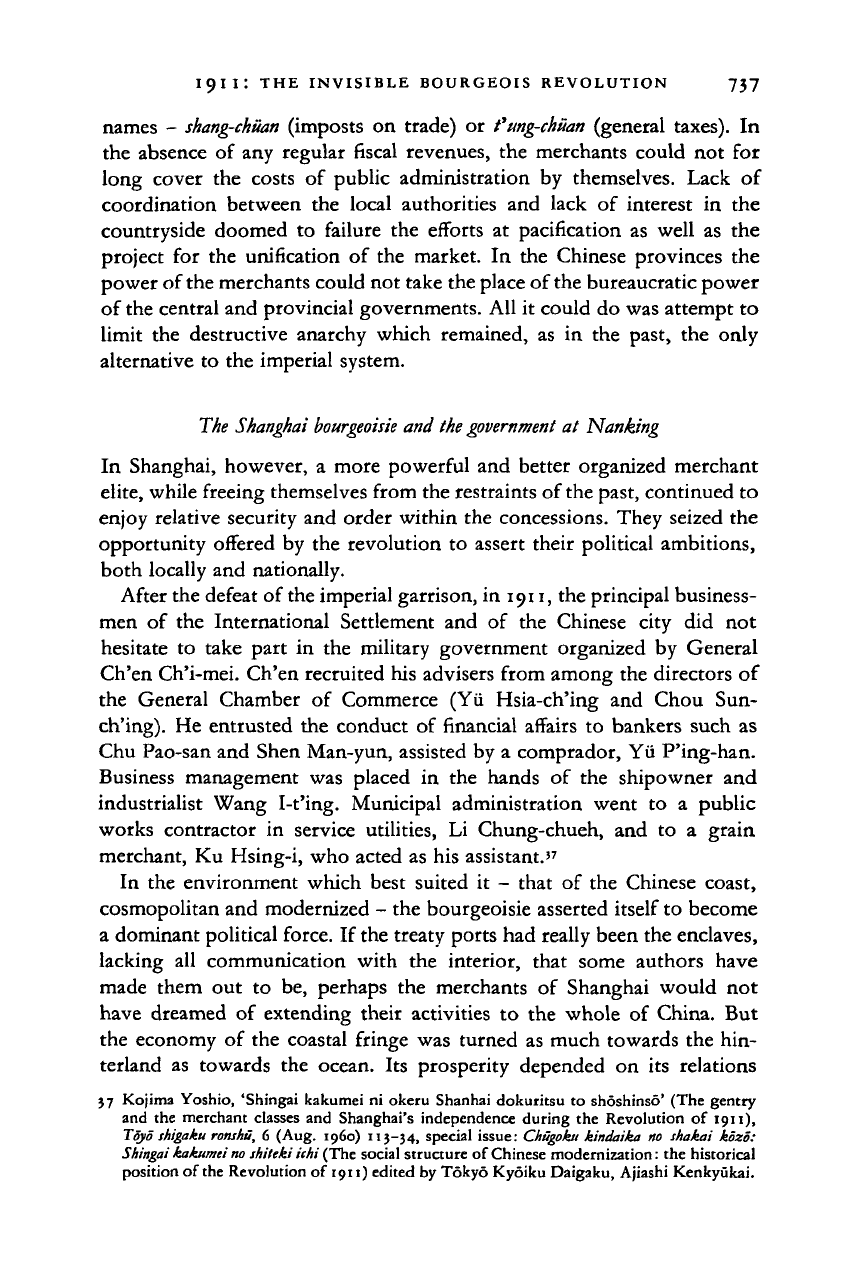
191 I : THE INVISIBLE BOURGEOIS REVOLUTION 737
names -
shang-chuan
(imposts on trade) or
fung-chuan
(general taxes). In
the absence of any regular fiscal revenues, the merchants could not for
long cover the costs of public administration by themselves. Lack of
coordination between the local authorities and lack of interest in the
countryside doomed to failure the efforts at pacification as well as the
project for the unification of the market. In the Chinese provinces the
power of the merchants could not take the place of the bureaucratic power
of the central and provincial governments. All it could do was attempt to
limit the destructive anarchy which remained, as in the past, the only
alternative to the imperial system.
The Shanghai
bourgeoisie
and
the government
at Nanking
In Shanghai, however, a more powerful and better organized merchant
elite,
while freeing themselves from the restraints of the past, continued to
enjoy relative security and order within the concessions. They seized the
opportunity offered by the revolution to assert their political ambitions,
both locally and nationally.
After the defeat of the imperial garrison, in
1911,
the principal business-
men of the International Settlement and of the Chinese city did not
hesitate to take part in the military government organized by General
Ch'en Ch'i-mei. Ch'en recruited his advisers from among the directors of
the General Chamber of Commerce (Yii Hsia-ch'ing and Chou Sun-
ch'ing).
He entrusted the conduct of financial affairs to bankers such as
Chu Pao-san and Shen Man-yun, assisted by a comprador, Yii P'ing-han.
Business management was placed in the hands of the shipowner and
industrialist Wang I-t'ing. Municipal administration went to a public
works contractor in service utilities, Li Chung-chueh, and to a grain
merchant, Ku Hsing-i, who acted as his assistant.'
7
In the environment which best suited it - that of the Chinese coast,
cosmopolitan and modernized - the bourgeoisie asserted itself to become
a dominant political force. If the treaty ports had really been the enclaves,
lacking all communication with the interior, that some authors have
made them out to be, perhaps the merchants of Shanghai would not
have dreamed of extending their activities to the whole of China. But
the economy of the coastal fringe was turned as much towards the hin-
terland as towards the ocean. Its prosperity depended on its relations
37 Kojima Yoshio, 'Shingai kakumei ni okeru Shanhai dokuritsu to shoshinso' (The gentry
and the merchant classes and Shanghai's independence during the Revolution of 1911),
Toyo shigaku
ronshu,
6 (Aug. i960) 113-34, special issue:
Chugoku
kindaika no shakai kozo:
Shingai kakumei no
shileki
ichi
(The social structure of Chinese modernization: the historical
position of the Revolution of 1911) edited by Tokyo Kyoiku Daigaku, Ajiashi Kenkyukai.
Cambridge Histories Online © Cambridge University Press, 2008
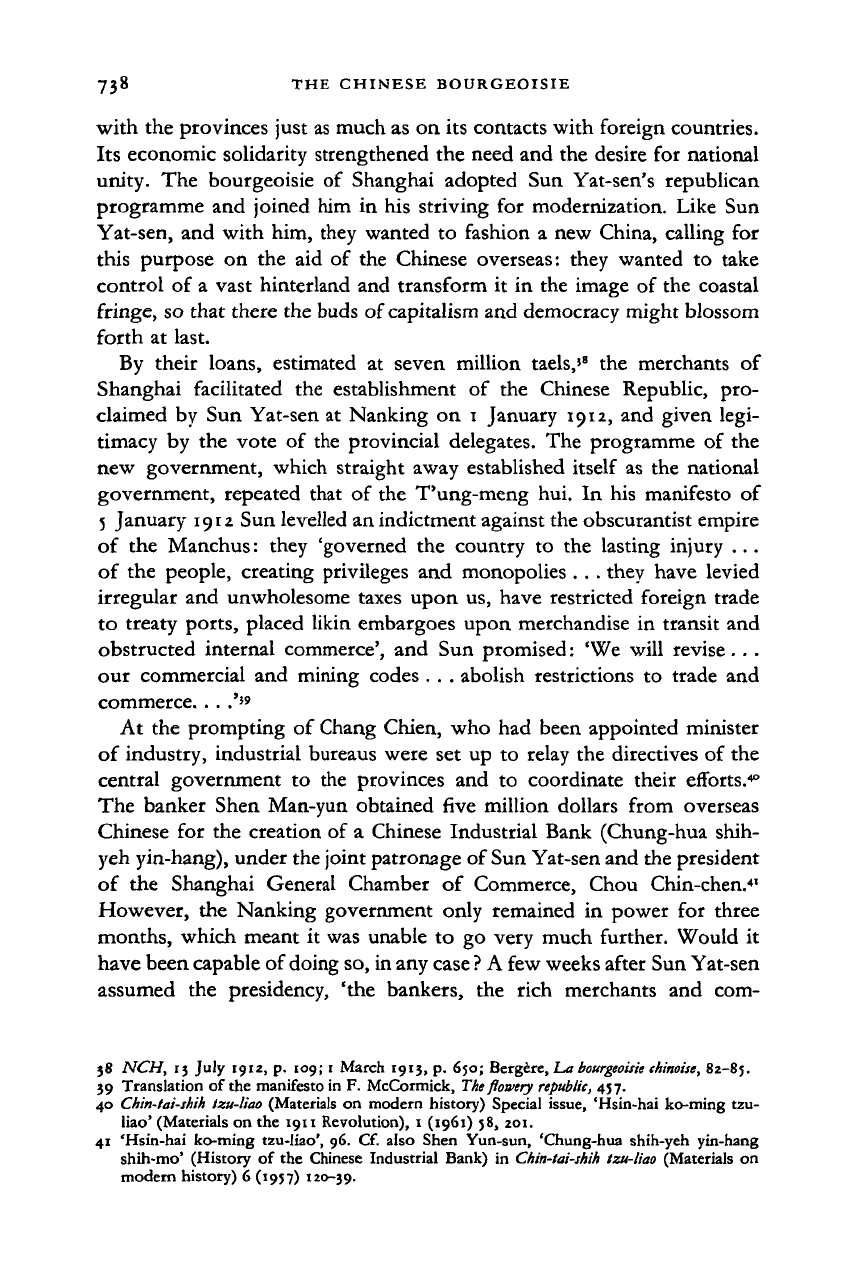
738 THE CHINESE BOURGEOISIE
with the provinces just as much as on its contacts with foreign countries.
Its economic solidarity strengthened the need and the desire for national
unity. The bourgeoisie of Shanghai adopted Sun Yat-sen's republican
programme and joined him in his striving for modernization. Like Sun
Yat-sen, and with him, they wanted to fashion a new China, calling for
this purpose on the aid of the Chinese overseas: they wanted to take
control of a vast hinterland and transform it in the image of the coastal
fringe, so that there the buds of capitalism and democracy might blossom
forth at last.
By their loans, estimated at seven million taels,'
8
the merchants of
Shanghai facilitated the establishment of the Chinese Republic, pro-
claimed by Sun Yat-sen at Nanking on 1 January 1912, and given legi-
timacy by the vote of the provincial delegates. The programme of the
new government, which straight away established itself as the national
government, repeated that of the T'ung-meng hui. In his manifesto of
5 January 1912 Sun levelled an indictment against the obscurantist empire
of the Manchus: they 'governed the country to the lasting injury .. .
of the people, creating privileges and monopolies . . . they have levied
irregular and unwholesome taxes upon us, have restricted foreign trade
to treaty ports, placed likin embargoes upon merchandise in transit and
obstructed internal commerce', and Sun promised: 'We will revise . . .
our commercial and mining codes . . . abolish restrictions to trade and
commerce. . . .'»
At the prompting of Chang Chien, who had been appointed minister
of industry, industrial bureaus were set up to relay the directives of the
central government to the provinces and to coordinate their efforts.
40
The banker Shen Man-yun obtained five million dollars from overseas
Chinese for the creation of a Chinese Industrial Bank (Chung-hua shih-
yeh yin-hang), under the joint patronage of Sun Yat-sen and the president
of the Shanghai General Chamber of Commerce, Chou Chin-chen.
4
'
However, the Nanking government only remained in power for three
months, which meant it was unable to go very much further. Would it
have been capable of doing so, in any case
?
A few weeks after Sun Yat-sen
assumed the presidency, 'the bankers, the rich merchants and com-
j8 NCH, 15 July 1912, p. 109; 1 March 191}, p. 650; Bergere, La
bourgeoisie
chinoise,
82-85.
}9 Translation of the manifesto in F. McCormick, The
flowery
republic,
457.
40 Chin-tai-shih tzu-liao (Materials on modern history) Special issue, 'Hsin-hai ko-ming tzu-
liao'
(Materials on the 1911 Revolution), 1 (1961) 58, 201.
41 'Hsin-hai ko-ming tzu-liao', 96. Cf. also Shen Yun-sun, 'Chung-hua shih-yeh yin-hang
shih-mo' (History of the Chinese Industrial Bank) in Chin-tai-shih tzu-liao (Materials on
modern history) 6 (1957) 120-39.
Cambridge Histories Online © Cambridge University Press, 2008

I : THE INVISIBLE BOURGEOIS REVOLUTION 739
pradors . . . began to find the regime very hard to bear'.
41
Relations de-
teriorated between the business community and Ch'en Ch'i-mei, the
military governor of Shanghai, who sometimes resorted to harsh mea-
sures in order to obtain the necessary funds.
4
' When the government
decided, at the beginning of February, to mortgage the China Merchants'
Steam Navigation Company to guarantee a loan from abroad, it ran into
violent protests from the shareholders, among whom was Chou Chin-
chen.
44
The conflict that arose in Shanghai in 1912 does not seem analogous
to the resistance put up during the 1920s by the Cantonese bourgeoisie,
adherents of provincial particularism, to a Kuomintang government
anxious to extend its activities on a national basis, even at the price of the
difficult Northern Expedition. The Shanghai bourgeoisie shared with
Sun a very keen sense of national unity. However, they no doubt hoped
that the Nanking government, which had been established thanks to
their help, would be able rapidly to widen its foundations and find other
sources of support within the country. They soon discovered the extent
of their illusion. Deprived of an adequate social base, the Nanking govern-
ment could not count on the effectiveness of a party machine. At the
beginning of 1912 new parties started competing with the T'ung-meng
hui,
which had always been very loosely structured; and before long it
consisted of little more than Sun's immediate entourage. Faced with the
Peking-Wuchang axis, which embraced the vast majority of the regular
armed forces and enjoyed the support of the mandarinate and the tradi-
tionalist gentry, Sun was forced to take a back seat, and surrendered the
presidency of the republic to Yuan Shih-k'ai in February 1912.
Thus the first political experiment of the bourgeoisie in the spring of
1912 ended in a double failure. True, the bourgeoisie was able to make
its weight felt at that time. In the provinces, it had helped to ensure the
continuation of business as usual and the maintenance of a certain degree
of public order. Their support of the Nanking government had prevented
an unwanted return of the Manchu dynasty, and had contributed to the
formation of the republican regime. However, it had not succeeded in
setting up the political structures that were indispensable to its develop-
ment. In the provinces its social base was too poorly defined for its actions
to be truly distinguishable from those of the gentry. Nor could the
businessmen of Shanghai keep a national government in their hands
42 Report of the consul-general of France, Shanghai, 13 Jan. 1912. Quai d'Orsay Archives:
China-Interior politics, Chinese Revolution.
43 Report of the consul-general of France, Shanghai, 13, 17 and 18 Jan. 1912,
ibid.
44 NCH, 10 Feb. 1912, p. 356; 10 Aug. 1912, p. 405; 17 Aug. 1912, p. 458. Report of the
consul-general of France, Shanghai, 2 March 1912.
Cambridge Histories Online © Cambridge University Press, 2008
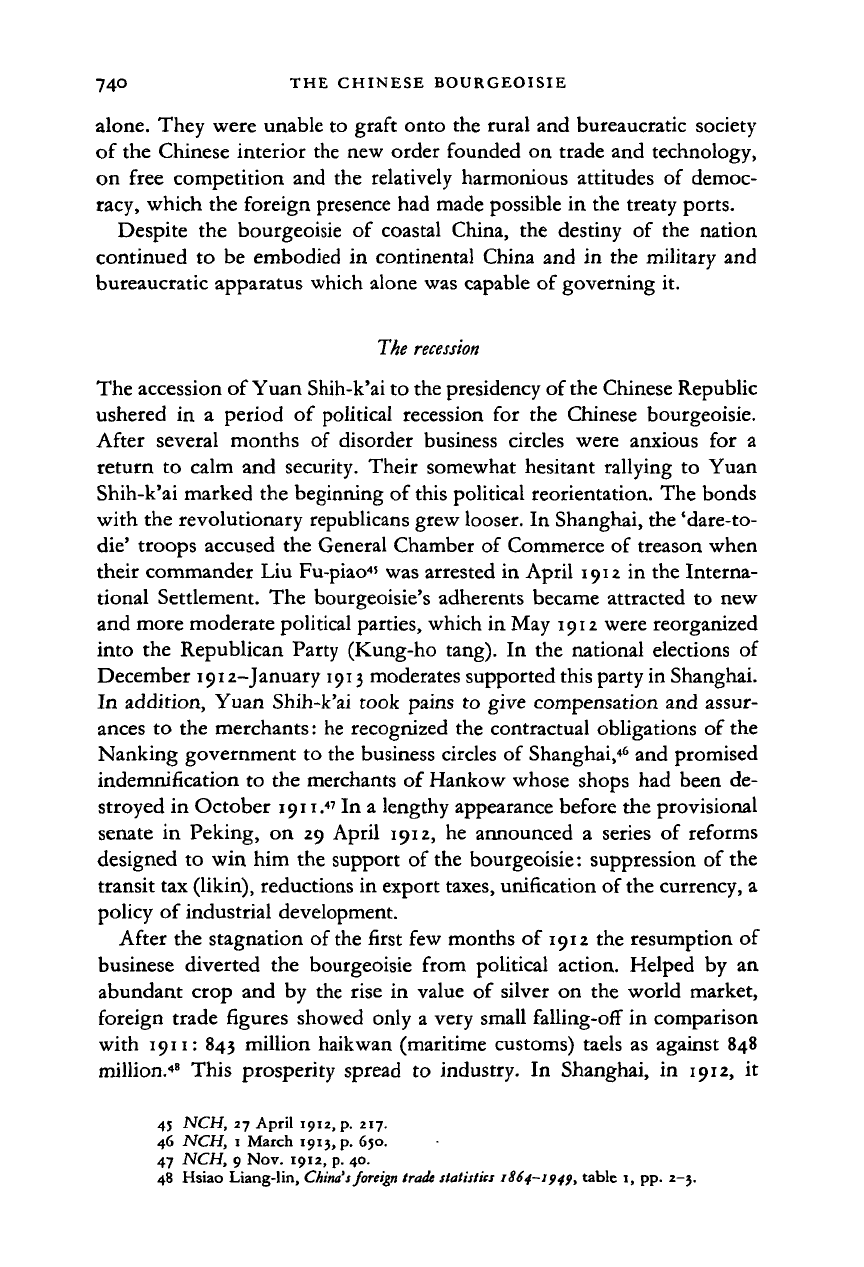
74° THE CHINESE BOURGEOISIE
alone. They were unable
to
graft onto
the
rural
and
bureaucratic society
of
the
Chinese interior
the new
order founded
on
trade
and
technology,
on free competition
and
the
relatively harmonious attitudes
of
democ-
racy, which
the
foreign presence
had
made possible
in
the
treaty ports.
Despite
the
bourgeoisie
of
coastal China,
the
destiny
of the
nation
continued
to be
embodied
in
continental China
and
in
the
military
and
bureaucratic apparatus which alone
was
capable
of
governing
it.
The recession
The accession
of
Yuan Shih-k'ai
to the
presidency
of
the Chinese Republic
ushered
in a
period
of
political recession
for the
Chinese bourgeoisie.
After several months
of
disorder business circles were anxious
for a
return
to
calm
and
security. Their somewhat hesitant rallying
to
Yuan
Shih-k'ai marked
the
beginning
of
this political reorientation.
The
bonds
with
the
revolutionary republicans grew looser.
In
Shanghai,
the
'dare-to-
die'
troops accused
the
General Chamber
of
Commerce
of
treason when
their commander
Liu
Fu-piao
4!
was
arrested
in
April
1912
in
the
Interna-
tional Settlement.
The
bourgeoisie's adherents became attracted
to
new
and more moderate political parties, which
in May 1912
were reorganized
into
the
Republican Party (Kung-ho tang).
In the
national elections
of
December 1912-January 1913 moderates supported this party
in
Shanghai.
In addition, Yuan Shih-k'ai took pains
to
give compensation
and
assur-
ances
to
the
merchants:
he
recognized
the
contractual obligations
of
the
Nanking government
to
the
business circles
of
Shanghai,
46
and
promised
indemnification
to
the
merchants
of
Hankow whose shops
had
been
de-
stroyed
in
October 1911.«'
In
a
lengthy appearance before
the
provisional
senate
in
Peking,
on
29
April
1912,
he
announced
a
series
of
reforms
designed
to
win him the
support
of
the
bourgeoisie: suppression
of
the
transit
tax
(likin), reductions
in
export taxes, unification
of
the currency,
a
policy
of
industrial development.
After
the
stagnation
of
the first
few
months
of
1912 the
resumption
of
businese diverted
the
bourgeoisie from political action. Helped
by an
abundant crop
and by the
rise
in
value
of
silver
on the
world market,
foreign trade figures showed only
a
very small falling-off
in
comparison
with 1911:
843
million haikwan (maritime customs) taels
as
against
848
million."
18
This prosperity spread
to
industry.
In
Shanghai,
in
1912,
it
45
NCH, 27
April 1912, p.
217.
46
NCH, 1
March 1913, p. 650.
47
NCH, 9
Nov. 1912, p. 40.
48
Hsiao Liang-lin, China's
foreign
trade statistics
1864—1949,
table
i,
pp. 2-3.
Cambridge Histories Online © Cambridge University Press, 2008
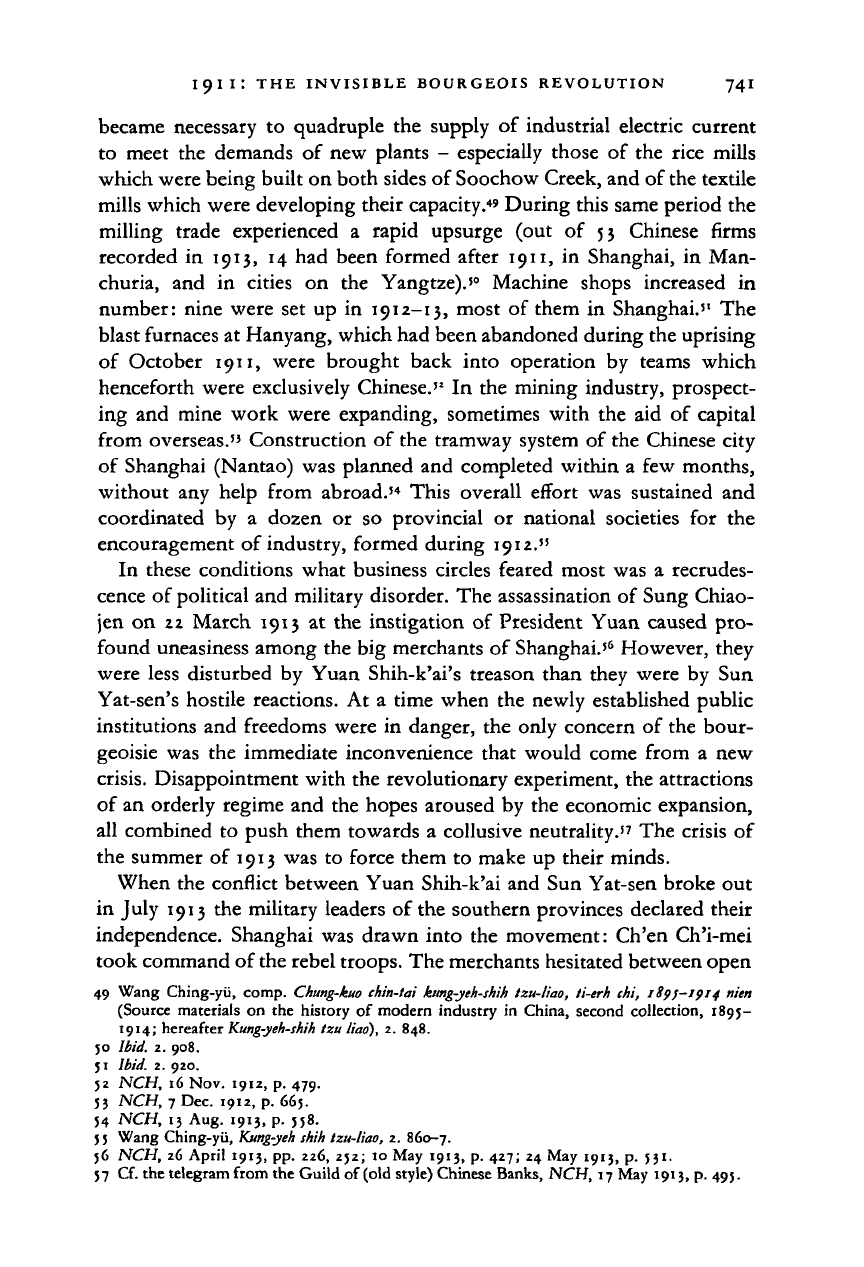
I 9 I I : THE INVISIBLE BOURGEOIS REVOLUTION 741
became necessary
to
quadruple
the
supply
of
industrial electric current
to meet
the
demands
of
new
plants
-
especially those
of
the
rice mills
which were being built
on
both sides
of
Soochow Creek,
and of
the textile
mills which were developing their capacity.
49
During this same period
the
milling trade experienced
a
rapid upsurge
(out of 53
Chinese firms
recorded
in
1913, 14 had
been formed after 1911,
in
Shanghai,
in
Man-
churia,
and in
cities
on the
Yangtze).'
0
Machine shops increased
in
number: nine were
set up
in
1912-13, most
of
them
in
Shanghai.'
1
The
blast furnaces
at
Hanyang, which
had
been abandoned during
the
uprising
of October
1911,
were brought back into operation
by
teams which
henceforth were exclusively Chinese.'
2
In
the
mining industry, prospect-
ing
and
mine work were expanding, sometimes with
the aid
of
capital
from overseas." Construction
of
the
tramway system
of
the
Chinese city
of Shanghai (Nantao)
was
planned
and
completed within
a
few
months,
without
any
help from abroad.'
4
This overall effort
was
sustained
and
coordinated
by a
dozen
or so
provincial
or
national societies
for the
encouragement
of
industry, formed during 1912."
In these conditions what business circles feared most
was
a
recrudes-
cence
of
political
and
military disorder.
The
assassination
of
Sung Chiao-
jen
on
22
March
1913
at
the
instigation
of
President Yuan caused
pro-
found uneasiness among
the big
merchants
of
Shanghai.'
6
However, they
were less disturbed
by
Yuan Shih-k'ai's treason than they were
by
Sun
Yat-sen's hostile reactions.
At
a
time when
the
newly established public
institutions
and
freedoms were
in
danger,
the
only concern
of
the
bour-
geoisie
was the
immediate inconvenience that would come from
a
new
crisis.
Disappointment with
the
revolutionary experiment,
the
attractions
of
an
orderly regime
and the
hopes aroused
by the
economic expansion,
all combined
to
push them towards
a
collusive neutrality."
The
crisis
of
the summer
of
1913
was to
force them
to
make
up
their minds.
When
the
conflict between Yuan Shih-k'ai
and Sun
Yat-sen broke
out
in July
1913 the
military leaders
of the
southern provinces declared their
independence. Shanghai
was
drawn into
the
movement: Ch'en Ch'i-mei
took command
of
the rebel troops.
The
merchants hesitated between open
49 Wang Ching-yii, comp. Chung-kuo chin-tai hmg-yeh-shih tzu-liao, ti-erh
chi,
lipj-ipi^ nien
(Source materials
on the
history
of
modern industry
in
China, second collection,
1895-
1914;
hereafter
Kung-yeh-shih
tzu
Had),
2. 848.
50
Ibid. 2. 908.
51
Ibid. 2. 920.
52
NCH,
16 Nov.
1912,
p. 479.
53
NCH,
7 Dec.
1912,
p. 665.
54
NCH,
13 Aug.
1913,
p. 558.
55 Wang Ching-yii,
Kung-yeh
shih tzu-liao,
2.
860-7.
56
NCH,
26
April
1913, pp. 226, 252;
:o
May 1913, p. 427; 24 May 1913,
p.
531.
57
Cf. the
telegram from
the
Guild of (old style) Chinese Banks,
NCH,
17 May
1913,
p. 495.
Cambridge Histories Online © Cambridge University Press, 2008
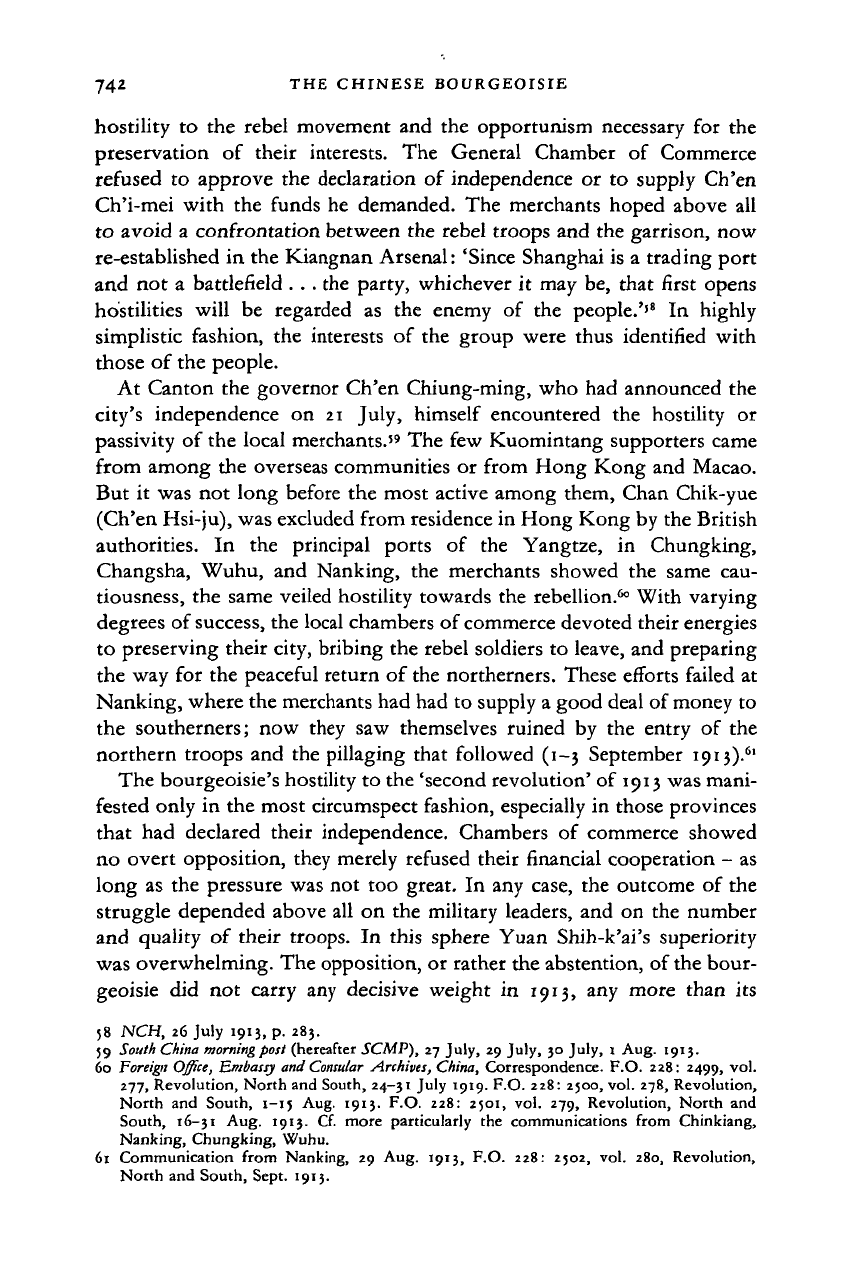
742 THE CHINESE BOURGEOISIE
hostility
to the
rebel movement
and the
opportunism necessary
for the
preservation
of
their interests.
The
General Chamber
of
Commerce
refused
to
approve
the
declaration
of
independence
or to
supply Ch'en
Ch'i-mei with
the
funds
he
demanded.
The
merchants hoped above
all
to avoid
a
confrontation between the rebel troops
and the
garrison,
now
re-established
in
the Kiangnan Arsenal: 'Since Shanghai
is a
trading port
and
not a
battlefield
. . .
the party, whichever
it
may be, that first opens
hostilities will
be
regarded
as the
enemy
of the
people.''
8
In
highly
simplistic fashion,
the
interests
of the
group were thus identified with
those
of
the people.
At Canton
the
governor Ch'en Chiung-ming, who
had
announced
the
city's independence
on 21
July, himself encountered
the
hostility
or
passivity
of
the local merchants.
59
The
few
Kuomintang supporters came
from among
the
overseas communities
or
from Hong Kong
and
Macao.
But
it
was
not
long before
the
most active among them, Chan Chik-yue
(Ch'en Hsi-ju), was excluded from residence
in
Hong Kong by the British
authorities.
In the
principal ports
of the
Yangtze,
in
Chungking,
Changsha, Wuhu,
and
Nanking,
the
merchants showed
the
same
cau-
tiousness,
the
same veiled hostility towards
the
rebellion.
60
With varying
degrees
of
success,
the local chambers
of
commerce devoted their energies
to preserving their city, bribing
the
rebel soldiers
to
leave, and preparing
the way
for the
peaceful return
of
the northerners. These efforts failed
at
Nanking, where the merchants had had
to
supply a good deal
of
money
to
the southerners;
now
they
saw
themselves ruined
by the
entry
of the
northern troops
and the
pillaging that followed (1-3 September 1913).
61
The bourgeoisie's hostility
to
the 'second revolution'
of
1913 was mani-
fested only
in the
most circumspect fashion, especially
in
those provinces
that
had
declared their independence. Chambers
of
commerce showed
no overt opposition, they merely refused their financial cooperation
- as
long
as the
pressure was
not too
great.
In
any case,
the
outcome
of the
struggle depended above
all on the
military leaders,
and on the
number
and quality
of
their troops.
In
this sphere Yuan Shih-k'ai's superiority
was overwhelming. The opposition,
or
rather the abstention,
of
the bour-
geoisie
did not
carry
any
decisive weight
in
1913,
any
more than
its
58
NCH, 26
July
191
j,
p. 283.
59 South China
morning
post (hereafter SCMP),
27
July,
29
July,
30
July,
1 Aug. 1913.
60 Foreign
Office,
Embassy and
Consular
Archives, China, Correspondence.
F.O. 228:
2499,
vo
'-
277,
Revolution, North and South, 24-31 July 1919. F.O. 228: 2500, vol. 278, Revolution,
North
and
South,
1—15 Aug.
1913.
F.O. 228:
2501,
vol. 279,
Revolution, North
and
South,
16-31 Aug.
1913.
Cf.
more particularly
the
communications from Chinkiang,
Nanking, Chungking, Wuhu.
61 Communication from Nanking,
29 Aug.
1913,
F.O. 228:
2502,
vol. 280,
Revolution,
North
and
South, Sept. 1913.
Cambridge Histories Online © Cambridge University Press, 2008
